|
|
|
Sort Order |
|
|
|
Items / Page
|
|
|
|
|
|
|
| Srl | Item |
| 1 |
ID:
186300
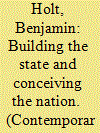

|
|
|
|
|
| Summary/Abstract |
In 1966 the Mizo National Front (MNF) instigated a separatist conflict against the Indian state. This article argues that an environment conducive for separatist insurgency was created by the early 1960s in the Mizo Hills, a direct result of problematic state- and nation- building practices. First, there was an inability to initiate a successful state-building drive to overcome deep-seated challenges bestowed by colonial rule. Second, the friction between regional and national conceptions of identity was not resolved. This argument exploits a clear research gap. Currently there is a convincing explanation for the MNF’s transition towards civil war between 1961-66. Yet, explaining the structural factors which created an environment conducive for separatist conflict remains elusive. This article plugs that gap, through archive-led historical analysis. In the process, it provides wider insights for conflict dynamics in India’s northeast and raises broader questions about interdisciplinary research in the subfield of intrastate conflict.
|
|
|
|
|
|
|
|
|
|
|
|
|
|
|
|
| 2 |
ID:
178910
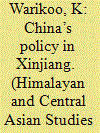

|
|
|
| 3 |
ID:
066889
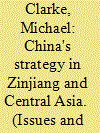

|
|
|
| 4 |
ID:
145629
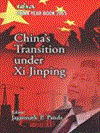

|
|
|
|
|
| Publication |
New Delhi, Pentagon Press, 2016.
|
| Description |
xviii, 427p.hbk
|
| Standard Number |
9788182749078
|
|
|
|
|
|
|
|
|
|
|
|
Copies: C:2/I:0,R:0,Q:0
Circulation
| Accession# | Call# | Current Location | Status | Policy | Location |
| 058700 | 327.51/PAN 058700 | Main | On Shelf | General | |
| 058701 | 327.51/PAN 058701 | Main | On Shelf | General | |
|
|
|
|
| 5 |
ID:
099659
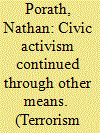

|
|
|
|
|
| Publication |
2010.
|
| Summary/Abstract |
This article explores the relationship between civil society and terror-violence. It argues that terrorism should be understood as "civic activism continued through other means." This allows us to distinguish it from state-terror. The article then explores the theme with data drawn from the political situation in the south of Thailand focusing on some recent events in which local Thai Malay-Muslims have protested against military presence. The paper also provides a brief history of the development of belligerent separatist groups in the area showing that they emerged after dissatisfaction with 20th century Thai civil-societal possibilities.
|
|
|
|
|
|
|
|
|
|
|
|
|
|
|
|
| 6 |
ID:
137311
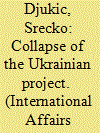

|
|
|
|
|
| Summary/Abstract |
THE SLAVIC PEOPLES are living through another severe conflict, but history never stops. The so-called Ukrainian project - a dream about Ukraine as a Western toehold (we all know whose) born as soon as the Soviet Union fell apart - is moving toward its defeat. The Ukrainian drama is rapidly approaching its culmination; the very ambiguous presidential elections of May 25 will draw a line beyond which the country will either fall apart or power will start talking to people to preserve an asymmetric Ukrainian confederation, that is, another "Ukrainian project.
|
|
|
|
|
|
|
|
|
|
|
|
|
|
|
|
| 7 |
ID:
080311
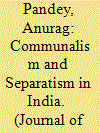

|
|
|
|
|
| Publication |
2007.
|
| Summary/Abstract |
Due to the rise and growth of the Bhartiya Janata Party (BJP) with its sister organizations in Indian politics, the existence of the Muslim political elite's communal attitude, acceptance of liberalized economic policy by India and the rise in mutual suspicion and hostile attitude among both Muslims and Hindus, India may witness a violent civil war between Hindus and Muslims in the future. The clashing political and economic interests and confronting attitude from both sides may lead them to be two different nations again. The spectre of Two Nations Theory may emerge once again.
|
|
|
|
|
|
|
|
|
|
|
|
|
|
|
|
| 8 |
ID:
129437
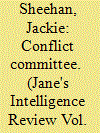

|
|
|
| 9 |
ID:
079924
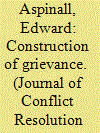

|
|
|
|
|
| Publication |
2007.
|
| Summary/Abstract |
This article makes a case for extending social constructivist approaches to the study of grievance in natural resource conflicts. It does this by analyzing the separatist conflict in Aceh, Indonesia, which is often portrayed as a paradigmatic resource conflict due to the importance of the natural gas industry there. It is argued here, however, that natural resource exploitation promoted conflict in Aceh only because it became entangled in wider processes of identity construction and was reinterpreted back to the population by ethnic political entrepreneurs in a way that legitimated violence. Rather than any intrinsic qualities of natural resource extraction, the key factor was the presence of an appropriate identity-based collective action frame. The argument is strengthened by comparison with two other resource-rich Indonesian provinces where resource extraction patterns were similar to Aceh but where no protracted violence occurred because similar identity resources were not available to local actors
|
|
|
|
|
|
|
|
|
|
|
|
|
|
|
|
| 10 |
ID:
176047
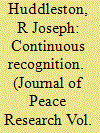

|
|
|
|
|
| Summary/Abstract |
How do self-determination groups move toward diplomatic recognition? Although recognition is the dominant activity used to understand international sovereignty, it is perhaps the most costly decision states make towards these groups. Third parties have many substantial interactions with aspiring states, building their sovereignty by other important means. I argue that our understanding of international sovereignty can be improved by conceptualizing it as a dynamic, continuous process, reflected in foreign policy decisions short of the legal recognition. I create a Bayesian latent variable model of international sovereignty, using bilateral data on diplomatic exchange, IGO voting, sanctions, military aid, and intervention in separatist conflicts. Complementing prior work on international sovereignty, my measure provides support for important theoretical expectations previously explored using only recognition as a measure of sovereignty. I find that diplomatic recognition, extant violence, separatist victory, and sour third-party–incumbent relations positively impact latent sovereignty of separatists, while concern for precedent negatively impacts it.
|
|
|
|
|
|
|
|
|
|
|
|
|
|
|
|
| 11 |
ID:
118770
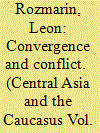

|
|
|
| 12 |
ID:
171064
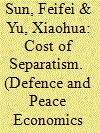

|
|
|
|
|
| Summary/Abstract |
The separatism and its related activities bring enormous economic costs to a society, which is however difficult to be estimated, because it involves both observable ethnic conflicts and unobservable psychological resistance. This paper investigates the economic consequences of the 1987–89 Tibetan Unrests with the synthetic control method and finds that per capita GDP in Tibet might be 27% higher for the period from 1988 to 2007 if the unrests had not happened. In addition, we implement several ‘placebo studies’ and assess the threats to the validity of causal inference to confirm the robustness of this study.
|
|
|
|
|
|
|
|
|
|
|
|
|
|
|
|
| 13 |
ID:
165888
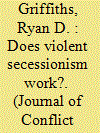

|
|
|
|
|
| Summary/Abstract |
Recent research suggests that the strategic use of violence may increase a group’s chance of gaining independence. We investigate this topic using comprehensive data on all secessionist movements between 1900 and 2006 and an original data set on the institutional and extrainstitutional methods that secessionists have used from 1946 to 2011. Our analysis yields several important findings. First, strategy depends on context. Not all secessionist movements are the same, and many have legal and/or institutional routes to independence that shape the methods that they employ. Second, no secessionist movement challenging a contiguous state has won its sovereignty without using institutional methods, either exclusively or in combination with extrainstitutional methods. Finally, we identify four successful combinations of secessionist methods and discuss how these movements develop in relation to their strategic setting. Overall, we find no evidence that violence helps a secessionist movement to gain independence.
|
|
|
|
|
|
|
|
|
|
|
|
|
|
|
|
| 14 |
ID:
153719
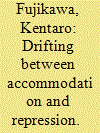

|
|
|
|
|
| Summary/Abstract |
A central government facing separatist activities adopts various policies to respond to them. In some cases, the government represses them harshly, while in other cases, it tries to accommodate the separatists’ demands. We currently have two strands in the literature to understand which policies are implemented by the government: the reputation theory and the cost-benefit calculation model. However, neither of them is sufficient to explain Indonesia's policies toward its separatists in Aceh and Papua following democratization. Indonesia's policies toward separatists have been drifting between accommodation and repression. To understand these policy shifts, this paper emphasizes the importance of the inner workings of the central government, introducing two variables: the preferences of national leaders and the existence of veto players. This paper demonstrates that these perspectives are essential in order to fully explain the Indonesian government's policies toward its separatists.
|
|
|
|
|
|
|
|
|
|
|
|
|
|
|
|
| 15 |
ID:
151157
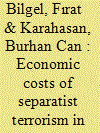

|
|
|
|
|
| Summary/Abstract |
Turkey has been suffering from separatist terrorism and the political conflict it implies since the mid-1980s, both of which are believed to have a negative impact on economic welfare. This article investigates the economic costs of Kurdistan Workers’ Party (PKK) terrorism, particularly in the Eastern and Southeastern provinces of Turkey by invoking the synthetic control method. We create a synthetic control group that mimics the socioeconomic characteristics of the provinces exposed to terrorism before the PKK terrorism emerged in the mid-1980s. We then compare the real gross domestic product (GDP) of the synthetic provinces without terrorism to the actual provinces with terrorism for the period 1975 to 2001. Causal inference is carried out by comparing the real per capita GDP gap between the synthetic and actual provinces against the intensity of PKK terrorist activity. Extended over a period of fourteen years (1988 to 2001), we find that after the emergence of terrorism, the per capita real GDP in Eastern and Southeastern Anatolia declined by about 6.6 percent relative to a comparable synthetic Eastern and Southeastern Anatolia without terrorism.
|
|
|
|
|
|
|
|
|
|
|
|
|
|
|
|
| 16 |
ID:
180226
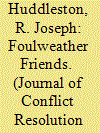

|
|
|
|
|
| Summary/Abstract |
This paper investigates how violence in self-determination conflicts influences bilateral foreign policy. I argue that a general preference for international stability causes third parties to support self-determination groups when violence reaches high levels, when they gain territorial control, and when major powers officially recognize. In these conditions, third parties perceive a stable new status quo to be nigh: unrecognized statehood. Ongoing instability encourages foreign policy that encourages the development of the de facto state, even when third parties have no intention of recognizing them as states. Importantly, I also show that targeting civilians erodes third-party support of the perpetrating side. I demonstrate these relationships using a latent variable model of international sovereignty of aspiring states, built on bilateral military, diplomatic, and economic exchange data. My model and tests provide new insight into how aspiring state actors become increasingly eligible for recognition through the tacit support of third-party states.
|
|
|
|
|
|
|
|
|
|
|
|
|
|
|
|
| 17 |
ID:
096150
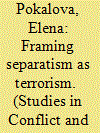

|
|
|
|
|
| Publication |
2010.
|
| Summary/Abstract |
Framing separatism as terrorism presents numerous opportunities for governments facing ethno-nationalist challenges. Namely, such framing allows states to avoid addressing the ethno-nationalist roots of separatist conflicts. This article analyzes incentives and opportunities that terrorism presents for states involved in ethno-nationalist separatist conflicts. The article investigates how the framing dynamics proved to be successful in the cases of the Kurdish and Chechen separatist conflicts. The case of Kosovo is examined as illustrative of a different outcome: the international presence in the Kosovo conflict made it substantially different from the previous cases and served as an intervention in the Serbian framing dynamics.
|
|
|
|
|
|
|
|
|
|
|
|
|
|
|
|
| 18 |
ID:
163202
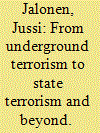

|
|
|
|
|
| Summary/Abstract |
Political terrorism has played an integral part in the independence struggle of several sovereign nations, and resistance and liberation movements have often had to resort to terrorism as a deliberate strategy. In the Finnish nationalist struggle for independence, a key role was played by the Jäger Movement, which combined the features of transnational war volunteerism and an underground organization. The military cooperation with Germany against the Russian Empire during the First World War, and the creation of the Finnish 27th Royal Prussian Jäger Battalion, also necessitated the establishment of a clandestine recruitment network in Finland, which effectively operated as an underground organization. During the war, the Jäger Movement was repeatedly faced with the question of resorting to reprisals and terror tactics. This process culminated in the autumn of 1916, and briefly showed signs of escalating to the level of an actual terror campaign, until it was cut short by the Russian February Revolution. Nonetheless, the accumulated propensity for political violence manifested itself during the subsequent Finnish Civil War, as well as during the far-right reaction of the early 1930s. The article approaches the question of terrorism in the Jäger Movement during this era, the issue of deploying “enforcement terror” during the independence struggle, and the subsequent distinctive participation of Jägers in state terror during the Civil War and the extreme right-wing political terror in the 1930s.
|
|
|
|
|
|
|
|
|
|
|
|
|
|
|
|
| 19 |
ID:
175066
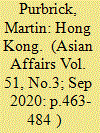

|
|
|
|
|
| Summary/Abstract |
This article explains why Hong Kong is a “torn city” with divisions in society resulting from the historical alignment of the city with the West, and the economic and political integration with Mainland China that reflects the vision of the governing and business elite of the city being part of the rise of China. The “torn city” reflects cultural divisions between the Western model of capitalism and governance and the communist system of the People's Republic of China. This cultural division and the resultant popular discontent have been exacerbated by poor governance in Hong Kong with a local government and the business elite that has resisted changes in governance to improve the welfare of those of the population who have not benefitted from economic growth in the city.
|
|
|
|
|
|
|
|
|
|
|
|
|
|
|
|
| 20 |
ID:
058602
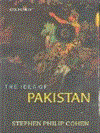

|
|
|
|
|
| Publication |
New Delhi, Oxford University Press, 2005.
|
| Description |
ix, 382p.hbk
|
| Standard Number |
0195673506
|
|
|
|
|
|
|
|
|
|
|
|
Copies: C:1/I:0,R:0,Q:0
Circulation
| Accession# | Call# | Current Location | Status | Policy | Location |
| 049077 | 954.91/COH 049077 | Main | On Shelf | General | |
|
|
|
|
|
|
|
|
|